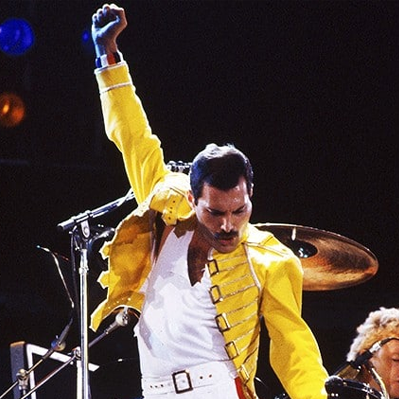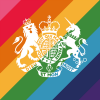- 1. Early life

MERCURY
Freddie
British singer-songwriter
Date of Birth: 5 September 1946
Date death: 24 November 1991
Age at the time of death: 45 years old
Zodiac sign: Virgo
Profession: Singer
Biography
Freddie Mercury was a British singer-songwriter, who achieved international fame as the lead vocalist of the rock band Queen. Regarded as one of the greatest singers in the history of rock music, he was known for his flamboyant stage persona and four-octave vocal range. Mercury defied the conventions of a rock frontman with his theatrical style, influencing the artistic direction of Queen.
Born in 1946 in Zanzibar to Parsi-Indian parents, Mercury attended English-style boarding schools in India from the age of eight and returned to Zanzibar after secondary school. In 1964, his family fled the Zanzibar Revolution, moving to Middlesex, England. Having studied and written music for years, he formed Queen in 1970 with guitarist Brian May and drummer Roger Taylor. Mercury wrote numerous hits for Queen, including "Killer Queen", "Bohemian Rhapsody", "Somebody to Love", "We Are the Champions", "Don't Stop Me Now" and "Crazy Little Thing Called Love". His charismatic stage performances often saw him interact with the audience, as displayed at the 1985 Live Aid concert. He also led a solo career and was a producer and guest musician for other artists.
Mercury was diagnosed with AIDS in 1987. He continued to record with Queen, and posthumously featured on their final album, Made in Heaven (1995). He announced his diagnosis the day before his death, from complications from the disease, in 1991 at the age of 45. In 1992, a concert in tribute to him was held at Wembley Stadium, in benefit of AIDS awareness. His career with Queen was dramatised in the 2018 biopic Bohemian Rhapsody.
As a member of Queen, Mercury was posthumously inducted into the Rock and Roll Hall of Fame in 2001, the Songwriters Hall of Fame in 2003, and the UK Music Hall of Fame in 2004. In 1990, he and the other Queen members were awarded the Brit Award for Outstanding Contribution to British Music, and one year after his death Mercury was awarded it individually. In 2005, Queen were awarded an Ivor Novello Award for Outstanding Song Collection from the British Academy of Songwriters, Composers, and Authors. In 2002, Mercury was voted number 58 in the BBC's poll of the 100 Greatest Britons.
Early life
Mercury was born Farrokh Bulsara in Stone Town in the British protectorate of Zanzibar (now part of Tanzania) on 5 September 1946. His parents, Bomi (1908–2003) and Jer Bulsara (1922–2016), were from the Parsi community of western India. The Bulsaras had origins in the city of Bulsar (now Valsad) in Gujarat. He had a younger sister, Kashmira.
The family had moved to Zanzibar so that Bomi could continue his job as a cashier at the British Colonial Office. As Parsis, the Bulsaras practised Zoroastrianism. Mercury was born with four supernumerary incisors, to which he attributed his enhanced vocal range. As Zanzibar was a British protectorate until 1963, Mercury was born a British subject, and on 2 June 1969 was registered a citizen of the United Kingdom and colonies after the family had emigrated to England.
Mercury spent most of his childhood in India where he began taking piano lessons at the age of seven while living with relatives. In 1954, at the age of eight, Mercury was sent to study at St. Peter's School, a British-style boarding school for boys, in Panchgani near Bombay. At the age of 12, he formed a school band, the Hectics, and covered rock and roll artists such as Cliff Richard and Little Richard. One of Mercury's former bandmates from the Hectics has said "the only music he listened to, and played, was Western pop music". A friend recalls that he had "an uncanny ability to listen to the radio and replay what he heard on piano". It was also at St. Peter's where he began to call himself "Freddie". In February 1963, he moved back to Zanzibar where he joined his parents at their flat.
In the spring of 1964, Mercury and his family fled to England from Zanzibar to escape the violence of the revolution against the Sultan of Zanzibar and his mainly Arab government, in which thousands of ethnic Arabs and Indians were killed. They moved to 19 Hamilton Close, Feltham, Middlesex, a town 13 miles (21 km) west of central London. The Bulsaras briefly relocated to 122 Hamilton Road, before settling into a small house at 22 Gladstone Avenue in late October. After first studying art at Isleworth Polytechnic in West London, Mercury studied graphic art and design at Ealing Art College, graduating with a diploma in 1969. He later used these skills to design heraldic arms for his band Queen.
Following graduation, Mercury joined a series of bands and sold second-hand Edwardian clothes and scarves in Kensington Market in London with Roger Taylor. Taylor recalls, "Back then, I didn't really know him as a singer—he was just my mate. My crazy mate! If there was fun to be had, Freddie and I were usually involved." He also held a job as a baggage handler at Heathrow Airport. Other friends from the time remember him as a quiet and shy young man with a great interest in music. In 1969, he joined Liverpool-based band Ibex, later renamed Wreckage, which played "very Hendrix-style, heavy blues". He briefly lived in a flat above the Dovedale Towers, a pub close to Penny Lane in Liverpool's Mossley Hill district. When this band failed to take off, he joined an Oxford-based band, Sour Milk Sea, but by early 1970 this group had broken up as well.
In April 1970, Mercury teamed up with guitarist Brian May and drummer Roger Taylor, to become lead singer of their band Smile. They were joined by bassist John Deacon in 1971. Despite the reservations of the other members and Trident Studios, the band's initial management, Mercury chose the name "Queen" for the new band. He later said, "It's very regal obviously, and it sounds splendid. It's a strong name, very universal and immediate. I was certainly aware of the gay connotations, but that was just one facet of it." At about the same time, he legally changed his surname, Bulsara, to Mercury. It was inspired by the line "Mother Mercury, look what they've done to me" from his song "My Fairy King".
Shortly before the release of Queen's self-titled first album, Mercury designed the band's logo, known as the "Queen crest". The logo combines the zodiac signs of the four band members: two lions for Deacon and Taylor (sign Leo), a crab for May (Cancer), and two fairies for Mercury (Virgo). The lions embrace a stylised letter Q, the crab rests atop the letter with flames rising directly above it, and the fairies are each sheltering below a lion. A crown is shown inside the Q, and the whole logo is over-shadowed by an enormous phoenix. The Queen crest bears a passing resemblance to the Royal coat of arms of the United Kingdom, particularly with the lion supporters.
Mentions in the news
Born in one day
(Dog) .
Horoscope Virgo: horoscope for today, horoscope for tomorrow, horoscope for week, horoscope for month, horoscope for year.











































